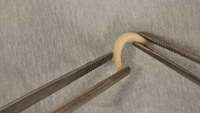Human–monkey chimeric embryos created using stem cells
Researchers in China and the USA have successfully grown chimeric embryos for up to 20 days by integrating human stem cells into primate embryos.
Gene therapy approach restores immune function to children with rare immunodeficiency disorder
Researchers from the University of California Los Angeles (UCLA; CA, USA) and Great Ormond Street Hospital (GOSH; London, UK) have collaborated to develop a new gene therapy for the treatment of severe combined immunodeficiency due to adenosine deaminase deficiency (ADA-SCID).
Mesenchymal stem cell treatment sees success in new muscular dystrophy study
Scientists at the Klara Medical Center (KMC; Czestochowa, Poland) have shown that mesenchymal stem cells (MSCs) can be used for the treatment of muscular dystrophies – a group of progressive muscle diseases caused by a genetic mutation, resulting in muscle weakness.
Exosome spray helps with heart repair in rats after myocardial infarction
Despite the improvements made in modern surgical techniques, diagnostics and medications for myocardial infarction, many individuals still struggle with the long-term effects of tissue damage. Now, researchers have developed a minimally invasive exosome spray that helped repair rat hearts after myocardial infarction.
New connection between metabolism and red blood cell development
To investigate the TIF1γ-controlled mechanism, the researchers performed a chemical screen on “bloodless” zebrafish, which lack early precursors for making functional red blood cells.
Gene therapy delivered to the brain shows promise in children with rare neurodegenerative disease
Scientists from Ohio State University have developed a novel method for delivering gene therapy to specific regions of the brain. Now, they have evidence from a small clinical trial in children that the treatment could address a rare, inherited neurodegenerative disease. And they believe their technique could eventually be used to treat more common brain diseases, like Alzheimer’s and Parkinson’s.
A new scoring system for assessing wound healing
Evaluating the efficacy of novel therapies requires the ability to monitor wound progression accurately and reproducibly over time. Researchers have proposed a new scoring system for wound healing in mice based on parameters in each phase of healing, as described in an article in the peer-reviewed journal Stem Cells and Development.












